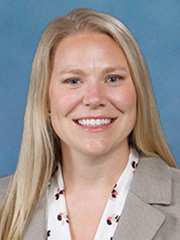The Division of Physical Therapy has named Jennifer Cooke as its director of clinical education. She is also an assistant professor and assistant director of clinical practice. More than 90 students rotate per year through clinical practicum experiences. The clinical practicum experience aims to train students to be generalists; they must complete four types of experiences, including in musculoskeletal, neuromuscular, acute care, and working in an underserved setting. Populations in each area can range from pediatrics to geriatrics.

Why is the clinical education practicum important for Doctor of Physical Therapy students?
“Clinical education bridges the classroom education to direct patient care allowing students to apply the concepts and procedures they’ve learned in the classroom and laboratory to the patient needing those aspects of physical therapy treatment,” Cooke said. “It also solidifies the importance of professionalism and clinical reasoning and merges the various concepts we teach in the curriculum into the complete picture of patient care.”
How can alumni and others get involved in clinical education?
“Alumni can get involved by serving as a clinical instructor and having their facility serve as a clinical site,” Cooke said. “Clinical instructors are able to train the next generation of clinicians and expose students to the many areas in which physical therapists practice.”
What is it like for you to see a student settle into a new passion?
“I really enjoy seeing a student find their passion through clinical education, especially when it’s different than they expected or planned for it to be,” Cooke said. “That speaks volumes to the value of the clinical education experience and the teaching that goes into that experience. The student then returns from the clinical really excited about learning more about that setting or population and using their future coursework to prepare them for working with those patients.”
What is the future of clinical education for the division?
Cooke said she sees more students going into the clinical experience in pairs or at different stages of their PT education. This would allow them to combine their academic preparation and skillsets to see a caseload of patients alongside a clinical instructor.
“I hope to see even more clinical sites and clinical instructors getting involved in the clinical education process because it’s such a valuable component of physical therapy education,” Cooke said.
Cooke, PT, DPT, is a three-time alumna of UNC-Chapel Hill and received her Doctor of Physical Therapy in 2008. Deborah Givens, PT, DPT, PhD, is the division’s director; the DPT program is ranked #15 in the country according to U.S. News & World Report.